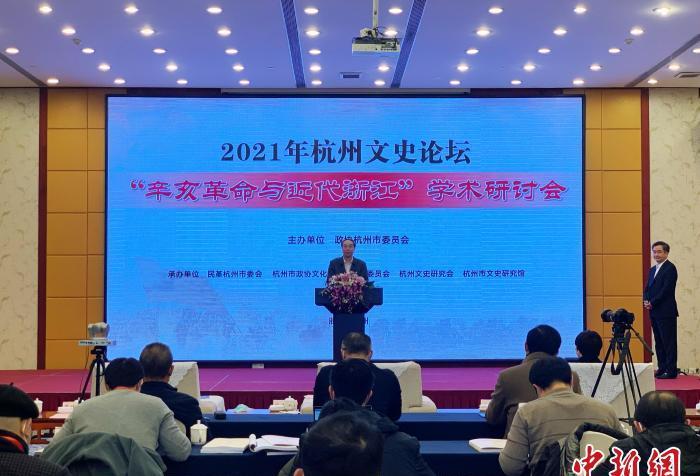
The scene of the academic seminar. Photo by Guo Qiyu
Hangzhou, 8 Jan (Xinhua) -- In 1911, the revolutionaries represented by Sun Yat-sen launched the Xinhai Revolution, which shocked the world, which was a great and arduous exploration of the Chinese and the advanced elements of China to realize national independence and people's liberation.
On January 8th, the Hangzhou Literature and History Forum and the Academic Seminar on "Xinhai Revolution and Modern Zhejiang" were held, and the academic community focused on the institutional transformation and spiritual strength of the Xinhai Revolution, as well as the important figures and events during the Xinhai Revolution, from which to explore historical laws, draw spiritual strength, innovate practical strategies, and continue to create the future.
The Xinhai Revolution overthrew the Qing government and ended the absolute monarchy that had lasted in China for thousands of years, ushering in profound social changes in China in modern times. Zhang Zhongmin, a professor at the Department of History at Fudan University, looked back at the changes in the world and the Chinese revolution from the perspective of the controversy between the government and the public during the Hongxian Emperor's regime on the construction of the three state systems.
His research proposes that in the process of Yuan Shikai's restoration of the imperial system, he was faced with three choices of constitutional monarchy, republic of China monarchy, and president hereditary, and finally Yuan Shikai decided to adopt constitutional monarchy as the choice of the state system of China.
"However, due to the rise of the Patriotic Movement, Yuan Shikai had no choice but to adopt the option of the founding of the Republic of China, which he had originally abandoned: to be called emperor and emperor internally, and still maintain the title of Republic of China and president externally." Zhang Zhongmin introduced.
In his research, Zhang Zhongmin believes that revealing those "hidden histories" is not to rebound pipa or curiosity, but to have a deeper understanding of the complexity of history and the full picture of historical figures on the basis of a more comprehensive possession of historical materials.
How to draw spiritual strength from the Xinhai Revolution more than 110 years ago? Wang Rui, an associate professor of the Department of History at East China Normal University, took the revolutionary morality proposed by Zhang Taiyan in the late Qing Dynasty and the early Ming Dynasty as an example, saying that the revolution should not only clean up the irrational political and social structure, but also let the morality that maintains the normal operation of Chinese society be carried forward again.
For example, Zhang Taiyan believes that the history books compiled by successive generations based on Confucian principles are an important carrier to stimulate revolutionary morality and revolutionary spirit, so that revolutionaries can realize that they are shouldering the heavy responsibility of the survival of Chinese civilization and can draw moral strength and responsibility from the deeds of ancient sages.
"The Xinhai Revolution was a major event in Chinese history, and the historical circles have produced fruitful results on it, and I don't think it is too much to evaluate the historical significance of the Xinhai Revolution." Chen Hongmin, professor and doctoral supervisor of the Department of History of the College of Humanities of Zhejiang University, said that the study of the Xinhai Revolution is not only a traditional historical topic, but also related to the development of the times.
For example, Chen Hongmin said that when he gave a general education class for undergraduates at Zhejiang University, every time he talked about the Xinhai Revolution, he would organize a student debate, "Whether the Xinhai Revolution succeeded or failed", and every student in each class always had unexpected new arguments and new arguments.
Zhang Kaiyuan, an expert on the history of the Xinhai Revolution, once said: China's modern historical narrative must, with a more transcendent mentality and a broad mind, regard the Chinese nation as a whole and truly place it in the world, and conduct macroscopic investigation and analysis for a long period of more than a hundred years, so that we can talk about the innovation of historiography and the emancipation of our minds, which will be of great benefit to China, the world, scholarship, and reality. (End)